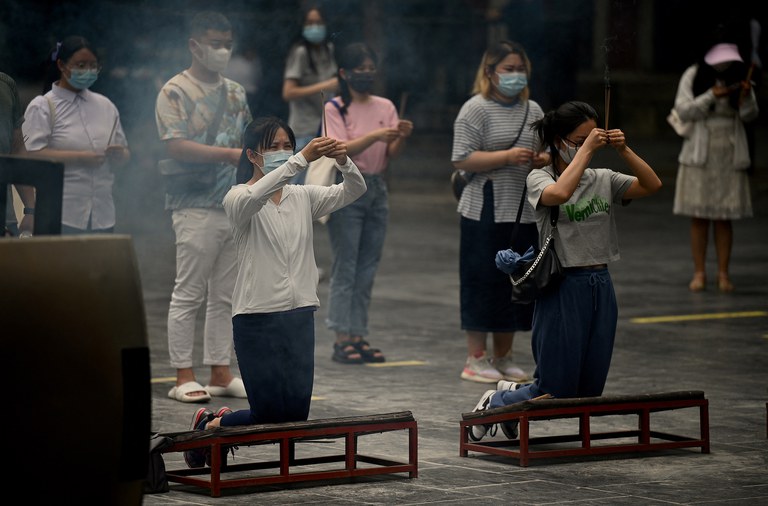As China copes with widespread youth unemployment and a flagging economy, a song about lying down, dropping out and burning incense in the hope of magically getting rich has become a viral sensation on social media.
The jaunty pop hit by singer Li Ermeng titled, “I can’t afford to worship in the Temple of Wealth,” has been dubbed the “lying flat” song in a reference to a passive attitude reportedly adopted by Generation Z in China in the face of an increasingly harsh economic climate.
“Lying flat,” also translated as “lying down,” is a buzzword that concerns the ruling Chinese Communist Party, which has targeted online content linked to the idea and played down dire youth unemployment figures, insisting that young people get less picky about the jobs they will do and show a more positive attitude.
“They’d understand what I’m suffering in the temple,” the song begins after a shrill alarm clock sound effect. “I’d rather rely on Buddha than on hard work.”
“I burned three yuan worth of incense today and wished for 3 hundred million,” Li sings. “The rest, I’ll leave up to fate.”
“From here on out, I’ll play the lottery instead of going to the temple,” run the lyrics to the song, which had spawned hundreds of copy-cat cover versions on Douyin, China’s version of Tik Tok, complete with its own hand-gesture dance, according to a keyword search on Tuesday.
“By day I draw career plans, by night I dream of marriage,” the song goes on.
“My boss counts his money while I get to eat different flavors of instant ramen,” it says, adding: “Not having love is OK, but not having no money really doesn’t work.”
Rejecting traditional milestones
Social media comments linked the song to the current economic climate, which means hard times for China’s young people, who have coined the term “political depression” to refer to their sense of hopelessness, and who are increasingly rejecting traditional milestones like finding a job, marriage and children.
“Times are getting harder every year, it’s harder and harder to make money, and prices just get higher and higher,” wrote Zhihu user @too_late. “People living at the bottom [of the economic ladder] are finding it harder every day.”
According to X user @powershitly, “lying flat is a form of nonviolent resistance among young people in China.”
“There’s no crime in being a Buddhist, and it’s rational to lie flat!” the user wrote on a post about the song.
X user @Sofigoodboy agreed, adding: “This is the sad reality of the younger generation.”

Social media influencer Chia-Paō Lee, who grew up in China but is now based in Taiwan, said students in China are taught that they will get a good job after graduation if they study hard, and yet jobs are now very hard to come by at all.
“One very important reason for the prevalence of lying flat culture is that no matter how hard you work, you can’t live a good life,” Lee told Radio Free Asia.
The last official youth unemployment rate released in July showed that around one in five young people in China is struggling to find a job.
And that figure – last reported at 21.3% – may just be the tip of the iceberg.
The hidden employed
Associate professor Zhang Dandan of Peking University says the true figure could be as high as 46.5%, if young people currently not looking for work and living in their parental home are taken into account.
According to a blog post by “Internet Diver” on Sina.com, many more young people are hidden from statistical indicators of unemployment because they have signed up for graduate degrees, or are taking time out to prepare for civil service examinations.

Chien-chung Wu, associate professor in general education at the Taipei University of Maritime Technology, said the ruling Chinese Communist Party has yet to come up with an effective economic policy to stimulate growth.
“Young people can’t see a future, and they can’t see any hope,” Wu said. “The so-called magic weapon has had no effect in boosting the economy, regardless of how many shots in the arm they give.”
Meanwhile, the government keeps up its “positive” propaganda about young people, quoting President Xi Jinping as saying that young people should “shoulder important responsibilities in the new era.”
“The majority of young people are meeting the needs of their country by shouldering their responsibilities and have courage to forge ahead, using hard work as their momentum for innovation,” state broadcaster CCTV said in a report aired on Oct. 2.
“[They are] singing the song of the youth in the New Era,” the report said, alongside footage of Xi visiting the elite Harbin Engineering University in the northeastern province of Heilongjiang in September, and featuring students from Shanghai Jiao Tong University’s school of oceanography carrying out research in the Arctic.
“On an expedition for glory and dreams, Chinese youth in the New Era are running hard along the track of youth, using the power and creativity of youth to stir up a surge of national rejuvenation, and using the wisdom and sweat of youth to build a better China!” the report said.
Translated with additional reporting by Luisetta Mudie. Edited by Malcolm Foster.



